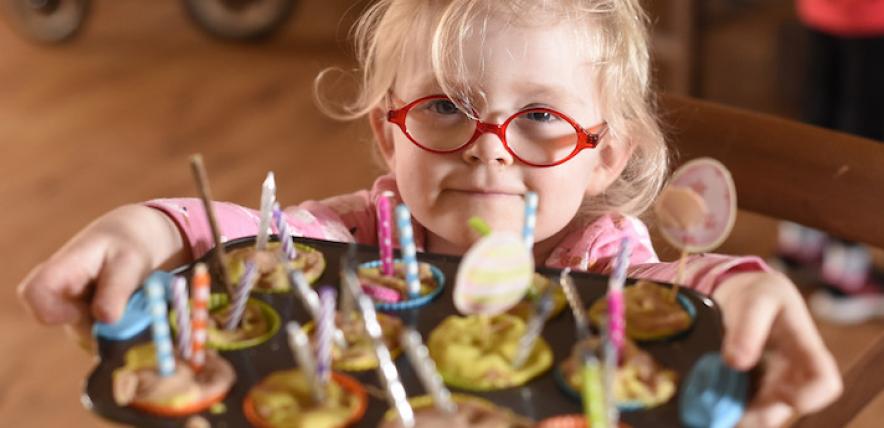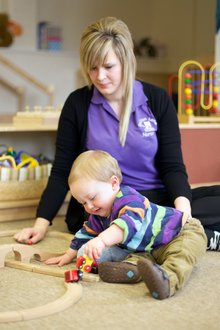By Karen Hirst of the Royal National Institute of Blind People (RNIB)'s Children, Young People and Families team.
I recently read an article written by a teacher and parent about the importance and value of openly discussing disability with children.
The writer later revealed that, as a child growing up with cerebral palsy, she was never invited to birthday parties.
Friendships can be hard.
I work within the Sight Loss Advice Service at the RNIB and one of the things that parents regularly ask is whether their child will lead a normal social life.
Vision impairment (VI) is a very rare disability in children but it can have a significant impact on their ability to pick up social skills.
Successful social interaction relies heavily on non-verbal communication such as smiles, gestures and body language.
A child who cannot see if someone is angry or happy, willing to share or wanting to be left alone, may find negotiating friendships a bit of a minefield!
Luckily, children are tolerant and will often happily adapt their play to suit a friend with different needs.
Most children with VI will go to a mainstream school and a truly inclusive setting will educate all pupils so that they understand and can support their classmate.
5 steps to help you successfully include children with vision impairment
But what happens when a child wants to invite their friend with vision impairment to a birthday party or a playdate?
It’s fair to say that very few adults will have met a child with VI let alone feel confident about keeping them entertained for an afternoon.
Looking after someone else’s children is pressure enough without having the added anxiety of being responsible for a child with additional needs.
When it comes to hosting a social activity for a child who is blind or partially sighted, there are a few simple things you can do to make sure everyone is included in the fun.
1. Ask the right questions
Most parents will be happy to talk to you about their child’s eye condition and how this affects their vision.
There is a common misconception that someone who is registered blind can’t see anything, but children are taught how to make the most of any vision they have.
Don’t be afraid to use words that relate specifically to vision – it’s perfectly fine to say things like, “Will he enjoy watching this film?”
Your child will be a good source of information too. Shared time together at school or nursery means they will know their friend’s likes and dislikes, what they can manage independently and where they might need a bit of support.
2. Getting ready at home
Before your guests arrive, walk through the areas that the children are likely to play in and think about.
- The location and position of larger objects – keep areas open and obstacle free where possible.
- Any steps, level changes and access to different rooms – are there any areas where you can safely leave children to play unsupervised? When will you need to be on hand to help – going up and down stairs for example?
- The lighting – find out whether moving from a shaded room indoors to bright sunlight in the garden or vice versa might need to be done slowly so the child’s vision can adjust.
- The location of toys and equipment – this should be within easy reach but tidied away when not in use, so they don’t become a trip hazard.
- The doors – either fully open or fully closed to avoid bumped heads on the edges!
3. First impressions
A quick tour when the child arrives will help them build a mental map of the space they will be playing in.
Limit the number of different areas they use until they’ve had time to get their bearings and are ready to explore further.
In a group of people, a child with VI might not understand whether an instruction or request is meant for them, so try to use everyone’s first names when talking: “Jack, would you prefer orange or blackcurrant juice?”
Keep instructions clear. For example, for party games and activities, avoid vague statements such as: “Everyone needs to start over there”. Instead, use specific language: “Holly, the pens are in a plastic box right in front of you.”
4. Games and activities
Many party games can be enjoyed by all children, including those with VI (pass the parcel is a perfect example!) but whatever you decide to play, ensure that the child with VI knows when an activity is about to start and when it has finished. Explain the rules and what will happen at different stages of the game.
Crafts and messy play are ideal and can be enjoyed inside or outdoors. A child with VI will particularly benefit from using materials that appeal to different senses – pens that are scented, items with good tactile quality or that create a sound and colours that contrast rather than light pastel shades.
5. Pre-party planning
If you’re planning a party away from home, speak to the venue and explain the different needs of all the children who will be attending. Most places are used to welcoming people with disabilities and all have a legal obligation to make reasonable adjustments to ensure everyone can join in.
For more play ideas and advice on how to include a child with vision impairment in social activities download RNIB’s free guide Parties and Playdates.
Where next?
How can I help my child make friends?







